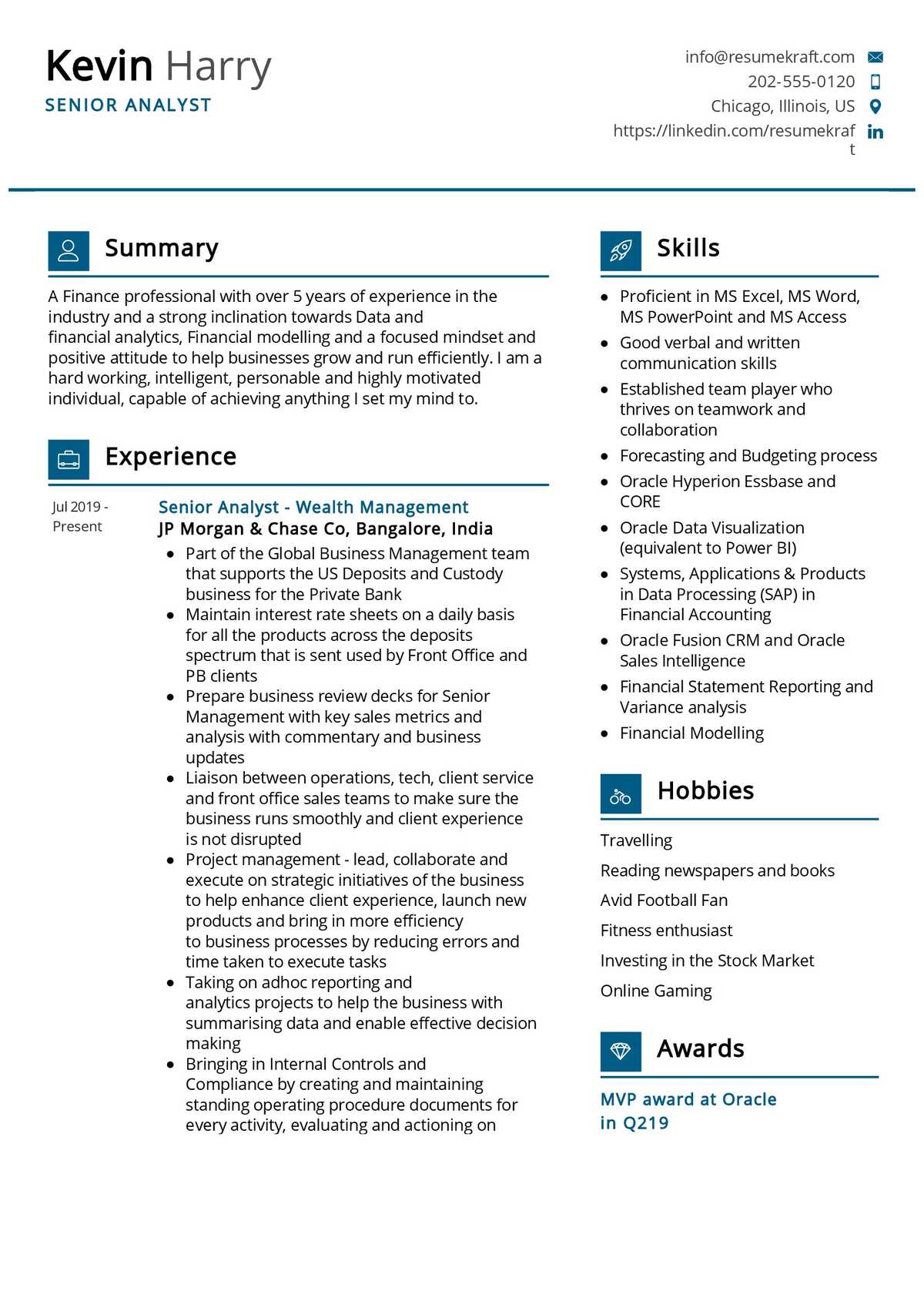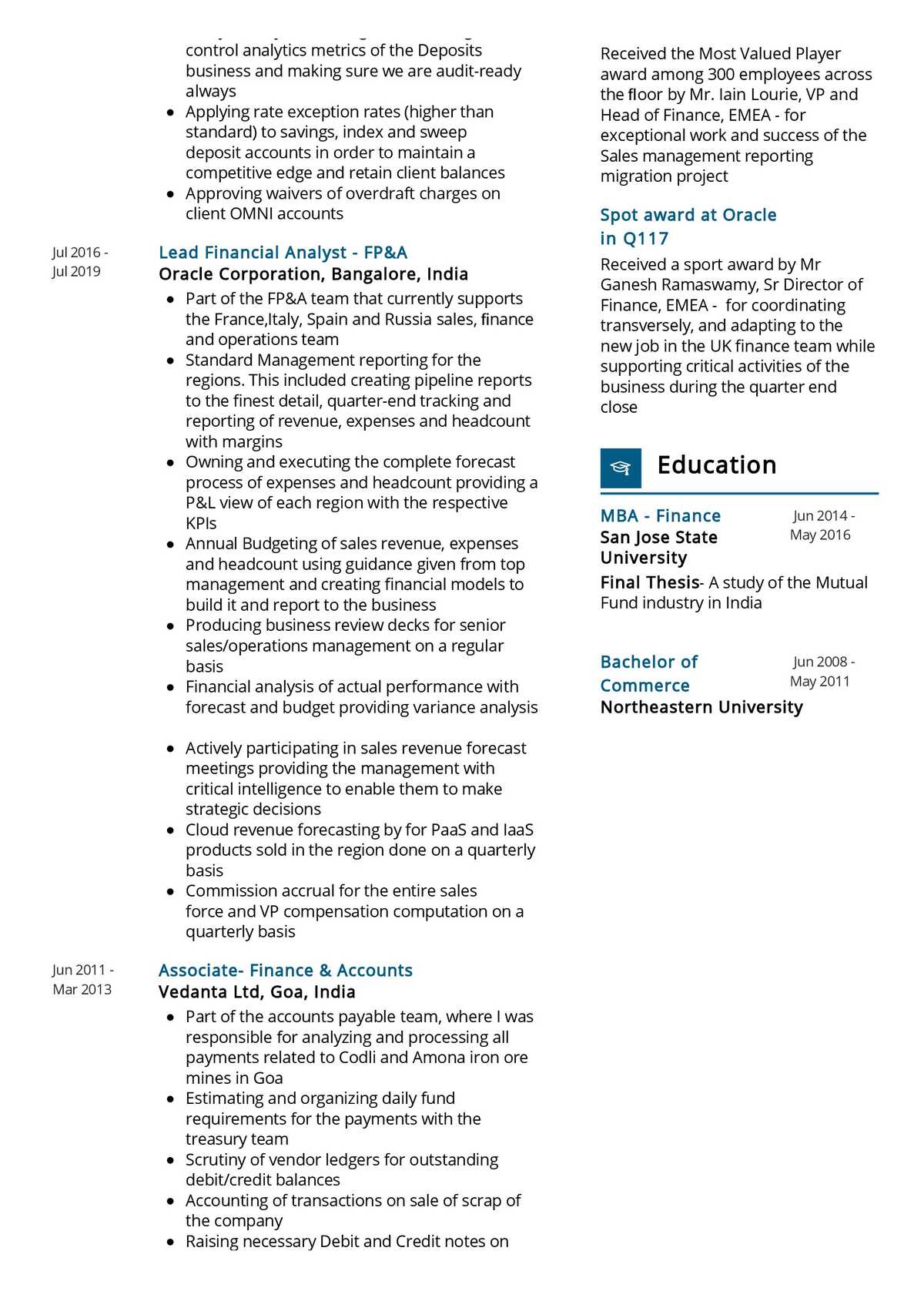Senior Analyst Resume Writing Guide
Have you found it difficult to figure out how to go about writing an ideal resume? Have you been wondering what sort of advice hiring managers are looking for when they read a Senior Analyst resume? If so, this article is for you.
Think about the specifics, such as your most recent position and the companies where you’ve worked. Strengthen your resume by including keywords and phrases hiring managers are looking for! Remember that for each position you list on your Senior Analyst resume, you need to include a few bullet points.
A lot of people make the mistake of listing their job title first in their Senior Analyst resume. This is ineffective. Your goal should be to showcase your relevant skills.
For example, if you’re experienced in data analysis, you should include these keywords in your resume: Analytical skills, Microsoft Excel, Microsoft Access, and SQL. This way, hiring managers can be aware of your abilities and can easily determine whether they are a good match for the job position. In addition to mentioning your experience on the job, be sure to include any certifications or licenses you’ve obtained. You should also use these bullet points to further explain how well-suited you are for the role.
Senior Analyst Resume Writing Tips
A resume is your first impression, you must make sure it stands out from the rest. Employers will screen your resume within seconds of receiving it. After 3-5 seconds, most will decide whether or not to read on. Your first lines should highlight what sets you aside from other candidates and should create interest in the reader to continue reading your resume for more information. You can start by stating you are a qualified applicant for the position. You will need to tie into the job description and make it clear why you are better than the other candidates.
Start by describing your relevant experience, you can list jobs in reverse chronological order, or prioritize your duties within each job. Use bullet points for different roles, provide specifics about each project’s outcome but not limited to a detailed description of how that project was accomplished.
You might also provide relevant job skills but do not overdo it. Refer to a list such as the 5 W’s, 4 P’s, or HBR Guide, these are some industry-standard questions that you should answer for each job to prove you know their work. You can also include your career highlights and professional awards.
The rest of the resume will be focused on your accomplishments that directly relate to the job requirements. You can provide details about how tasks were completed (i.e. Date, and Project), clearly list your accomplishments as well. You can also include a summary of how you made your staff proud to work with you.
The end of the resume will be an action-oriented section where you demonstrate how you performed on a job requirement. You can reference a checklist that illustrates exactly what was expected on a task or even a little bit more detailed description, this way the employer can see that you did indeed complete these tasks.
Senior Analyst Resume Sections
- Objective Statement [One Sentence]: Put simply, this section includes your overall career goals. Whether it is to make a career change or move into a different company, this will provide a statement that focuses on the end goal of your professional life.
- Summary Statement: This section should summarize the experience and education you possess that will help you be successful in the job you want to be hired for. A summary carries much more weight than an objective, which can be difficult to write efficiently and present in an exciting way.
- Skills Summary: Include a skill summary for each of your job experience and education. Remember to provide the names of the skills you possess, with examples of how you used them, which can give the reader an idea about your abilities and knowledge in each category.
- Professional References: List your professional references, including the company’s name and contact information. This is not optional. Your potential employer will want to be made aware that you do have hardworking friends who will vouch for your skills, both verbally and in writing.
- Education: Include all of the schools you have attended. Provide the name of each school, your major and minor, GPA, and degree received.
- Certification(s): List any certification(s) you have earned, as well as a description of what they are and when you earned them.
- Professional Experience: List your current position first on your resume before going in reverse chronological order with your previous jobs, listing the name of each company and dates worked at them.
Senior Analyst Resume Headline
The headline is designed to entice a hiring manager to read more about your candidacy. It should be optimized for human reading and enable you to introduce yourself by highlighting your experience in the most compelling way possible.
Do:
- Use strong action verbs and no more than six words here.
- Keep it as concise as possible, but make sure it is also clear and effective.
- Ensure it reflects what you are trying to achieve in the resume (e.g. Finance, Consulting, Marketing).
- Select the most appropriate format for this section based on how you want to present yourself.
- Use numbers or percentages to indicate achievements and to back up your claims.
- Use bullet points to highlight your key skills and experiences.
Don’t:
- Don’t use phrases like “excellent communicator” or “hard-working.” Aim for something more specific instead – e.g. “Motivated, strong leadership skills in managing teams in the financial services industry” or “Increased sales by 20% as a result of CRM software implementation.”
- Use jargon like “strategic thinker” or “team player.” This could be confused with your potential manager.
Senior Analyst Resume Summary:
Writing a summary is the most important part of your resume because it’s what will set you apart. Come up with a short paragraph that summarizes what you’re looking for and why a company should hire you.
You don’t need to use fancy-schmancy language or advanced vocabulary; just talk to the reader like they’re your friend and tell them what they want to hear (for example, “I’m keen on getting a job that requires me to work with a team, while also using my analytical skills”).
Tip: You can reference your cover letter for this section as well.
Summary example:
“8+ years of experience in a growing company; looking for a new job at a firm that’s stable but still progressive.”
“Having worked as a Senior Analyst at Angel Business Development, I am now looking for new opportunities to advance my career and gain more responsibility.”
Senior Analyst – Overview:
Write an introductory paragraph that will grab the employer’s attention. Talk about why you’re perfect for the position – don’t wait until later in your resume. Introduce yourself, your experience, and why you’d be a great fit to work with them.”
Top 20 Skills to Include in a Senior Analyst Resume
- Analytical skills
- Communication and interpersonal tools
- Terminal OS experience
- Knowledge of digital marketing
- Systems and software engineering skills
- Project management experience
- Technical/IT skills such as: hardware, firewall, data storage, SAN, scripting etc.
- Web design knowledge and experience
- Certificate of completion of training courses such as Google AdWords, Microsoft Project, IBM Series 7, etc.
- Computer literacy: Microsoft Office tools (Word, Excel and PowerPoint), LN Testing Tools (Loadrunner, Travicom TestDirector, etc.), browser configuration management tools such as QA Manager Pro or ManageEngine ServMan and Linux command line knowledge.
- Experience in using network monitoring software such as PRTG Network Monitor or Nagios
- Experience in dealing with vendor management
- Experience in using CRM tools (Microsoft Dynamics CRM, Salesforce, SugarCRM, Oracle Siebel, etc.)
- Experience with web statistics analysis and reporting tools such as Google Analytics or Yahoo Web Analytics
- Working experience with social media networks: Twitter, YouTube, Facebook etc., and working knowledge of the culture of social media communities
Tips to Write a Senior Analyst Cover Letter
- Use the position name and number to address the letter directly to the hiring manager.
- Summarize your key accomplishments in one to two paragraphs.
- Highlight your achievements with numbers, where possible.
- Mention any examples you can use which show your potential value for that specific role you’re applying to.
- Always keep it short and relevant, i.e. – sell yourself by highlighting stats and achievements, not by repeating what’s in your resume.
- Show your expertise and experience by describing your achievements in detail.
- Mention how you can help the organization by doing X or Y.
- Remember to thank the person for their time and consideration, and make a point of conveying that you are excited about this position.
Key Takeaways
- Turn your degrees into job skills
- You can customize your resume to suit your specific job goals
- Use action verbs to showcase skills that make you stand out from the crowd
- Action verbs make a great heading for an executive summary



